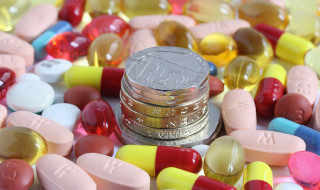 Pharmaceutical companies are finding new ways to keep the prices of their drugs and medicines high, which is hitting the NHS, Kevin Lewis says.
Pharmaceutical companies are finding new ways to keep the prices of their drugs and medicines high, which is hitting the NHS, Kevin Lewis says.
You may be forgiven for thinking that I have disappeared for an early holiday half way through this column.
One or two of my regular readers (and quite possibly, both of them) will already have spotted that it is shorter than usual, and deliberately so.
In an ever-busier and more challenging world where everyone has to spread their time and attention more thinly, the world of communications has also changed.
So in future my regular column will be shorter, and its content and commentary served in more easily digestible chunks. Where the subject matter lends itself to more background information and deeper analysis – but not in every issue – my column will be supported by an expanded analysis article. For those who have the stamina and endurance and haven’t already lost the will to live, that is. And don’t go looking for it in this issue because there isn’t one.
Sqandered resources
The title I have given to his column, I should quickly explain, does not refer to my plan for this and future columns as described above. Rather, it refers to the shocking revelations in The Times early this month that staggering amounts of precious NHS resources are being squandered on ill-conceived drug and medicine procurement policies. These policies make a mockery of any claim that NHS managers are masters at husbanding precious NHS funding and committed to giving tax payers the best possible value for money – although nobody can question the outstanding return that they deliver for the shareholders of the pharma companies involved.
Everybody understands that the costs of pharmaceutical research and development are high, timescales from lab to market are long, and life cycles of patents are short. That is why so many drugs are inordinately expensive when they are first introduced. That is also why the price is meant to fall sharply once patents have expired.
What has been happening in far too many cases, it seems, is that ways have been found to keep prices inflated. Inexplicably and obscenely inflated, but not illegally because (for example) private equity firms have spotted and taken advantage of a weakness in the controls, buying up the exclusive marketing rights for drugs whose patents (and associated price controls) have long since expired. The companies then prise open the NHS cashpoint by switching the drugs from their former brand names to generic names and then start nudging the price up as the system allows them to do. When I say ‘nudge’ I mean that well over 200 out-of-patent drugs have at least doubled in price in the past five years, more than 30 of them having increased by 1,000% or more. One has increased by 12,500% in just eight years.
From just 50 drugs, the windfall to the companies concerned (and their investors) has been £260 million in barely five years, all of which comes out of the NHS budget. And this is not the whole cost but simply the ‘extra’ pricing margin.
Exchange rates
Being something of a mathematical genius I have just calculated at the speed of light how many UDAs there are in £260 million. And I can confirm with confidence that it is quite a few. It is timely and somewhat ironic, then, that as recently as my previous column I was arguing that NHS managers and procurement experts should not always assume that getting something cheaper is necessarily a smart idea. Sometimes paying more is the route to higher quality, I suggested. But it looks like they are taking me far too literally.
Sarah Wollaston is the Conservative MP for Totnes and the highly respected chair of the Commons Health Select Committee. The one that entertained Bill Moyes and Evlynne Gilvarry in March 2015 and the dental profession shortly thereafter, as soon as it was uploaded onto Youtube. By way of a reminder, the opening exchanges with the GDC went like this: (Sarah Wollaston to Bill Moyes) ‘Perhaps I could cut to the chase and say that we have heard a lot of evidence that dentists in Britain have lost confidence in the GDC as their professional regulator. Could you comment on that and set out what your strategy is to try to put that right?’
Bill Moyes then gave a somewhat circuitous reply describing the number of complaints reaching the GDC, to which Sarah Wollaston responded ‘To be fair, Dr Moyes, that was not the question I asked you, and we are going to come to all those points in detail later on. The question I asked you was on the issue of loss of confidence from the profession, and your response seemed to indicate that that was inevitable because patients were writing in to complain. Does it concern you that there appears to be a loss of confidence from the profession?’
Unsurprisingly, these price increases for out-of-patent drugs are already on the legendary Wollaston radar and her hot button has clearly been activated. Questioning how the companies can ‘possibly justify’ such ‘eye-watering’ increases, she and her Select Committee colleagues are on the march and I am sure we have not heard the last of this, either from them or from the Competition and Markets Authority (CMA). And quite right too, at a time when the NHS is wringing its hands and pleading poverty, when NHS staff want and need pay increases and dentistry and many other crucial services are short of adequate funding.


